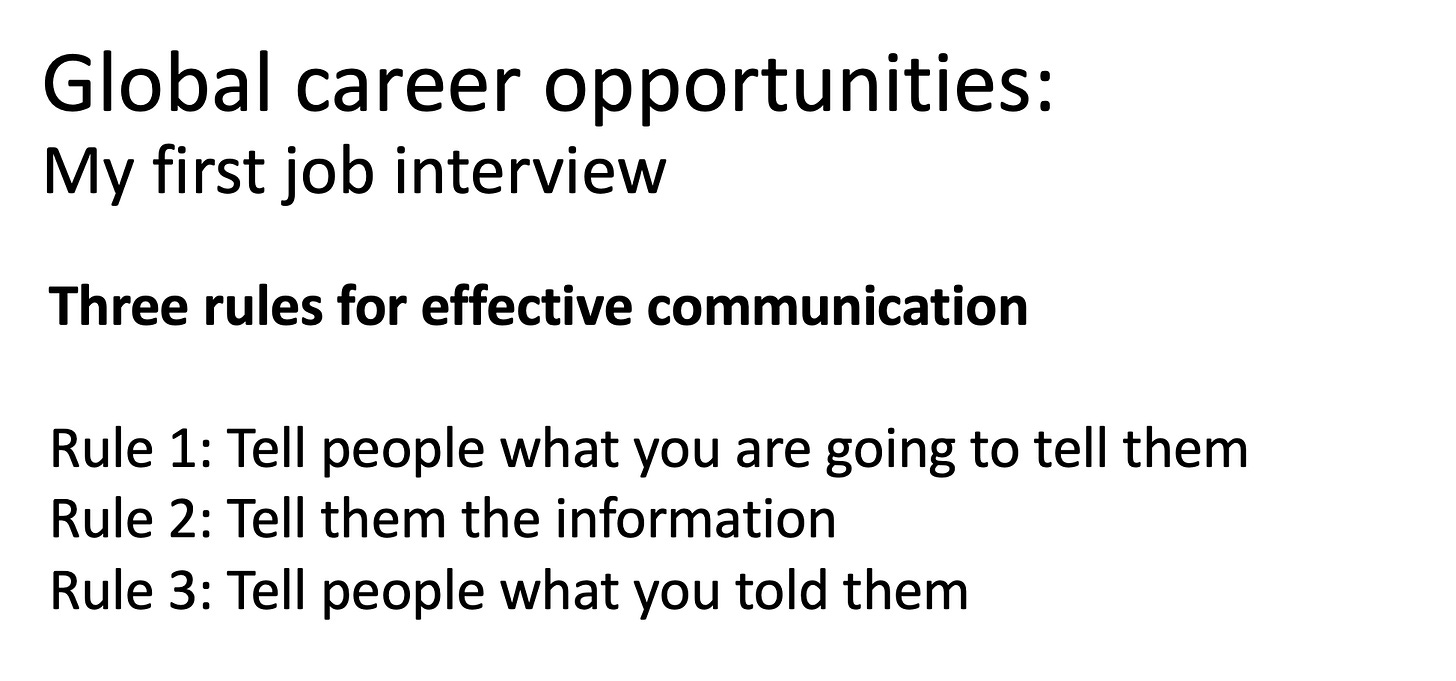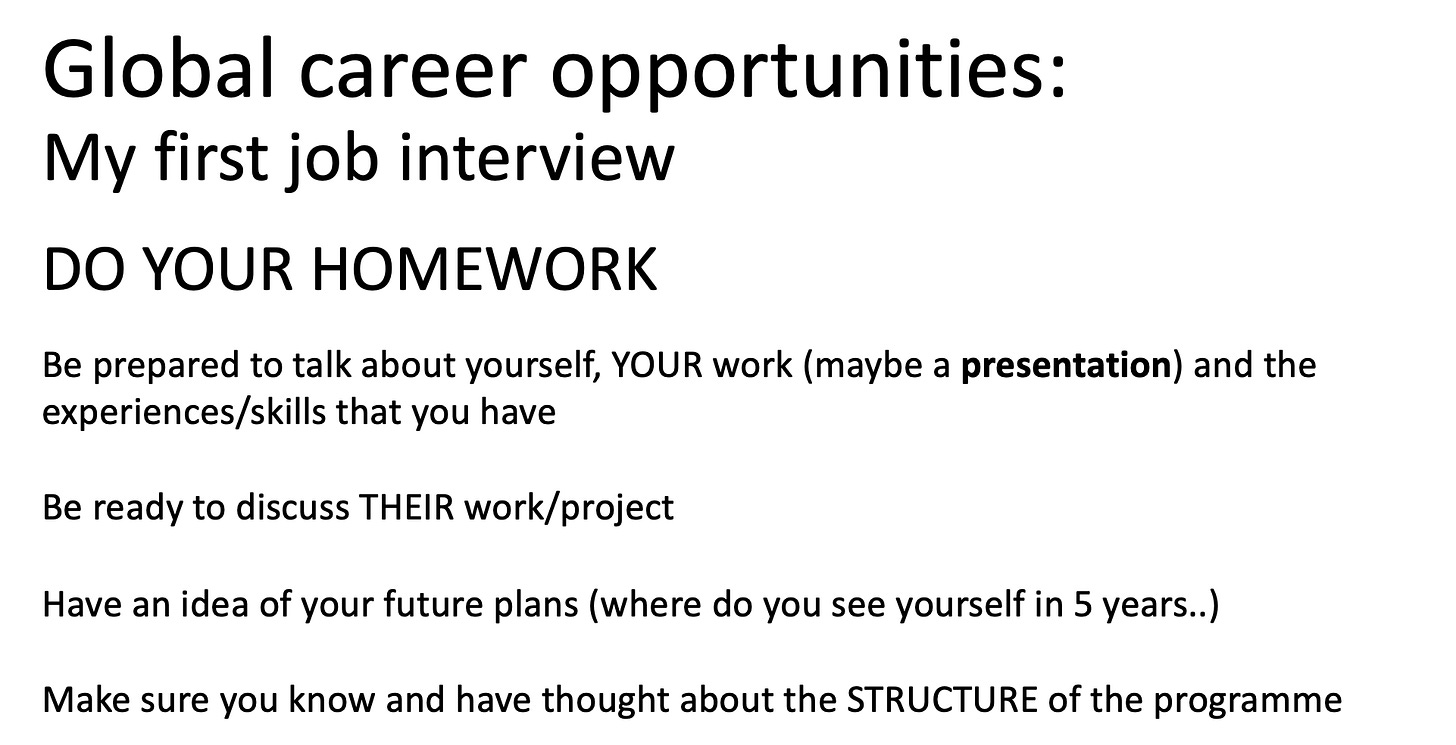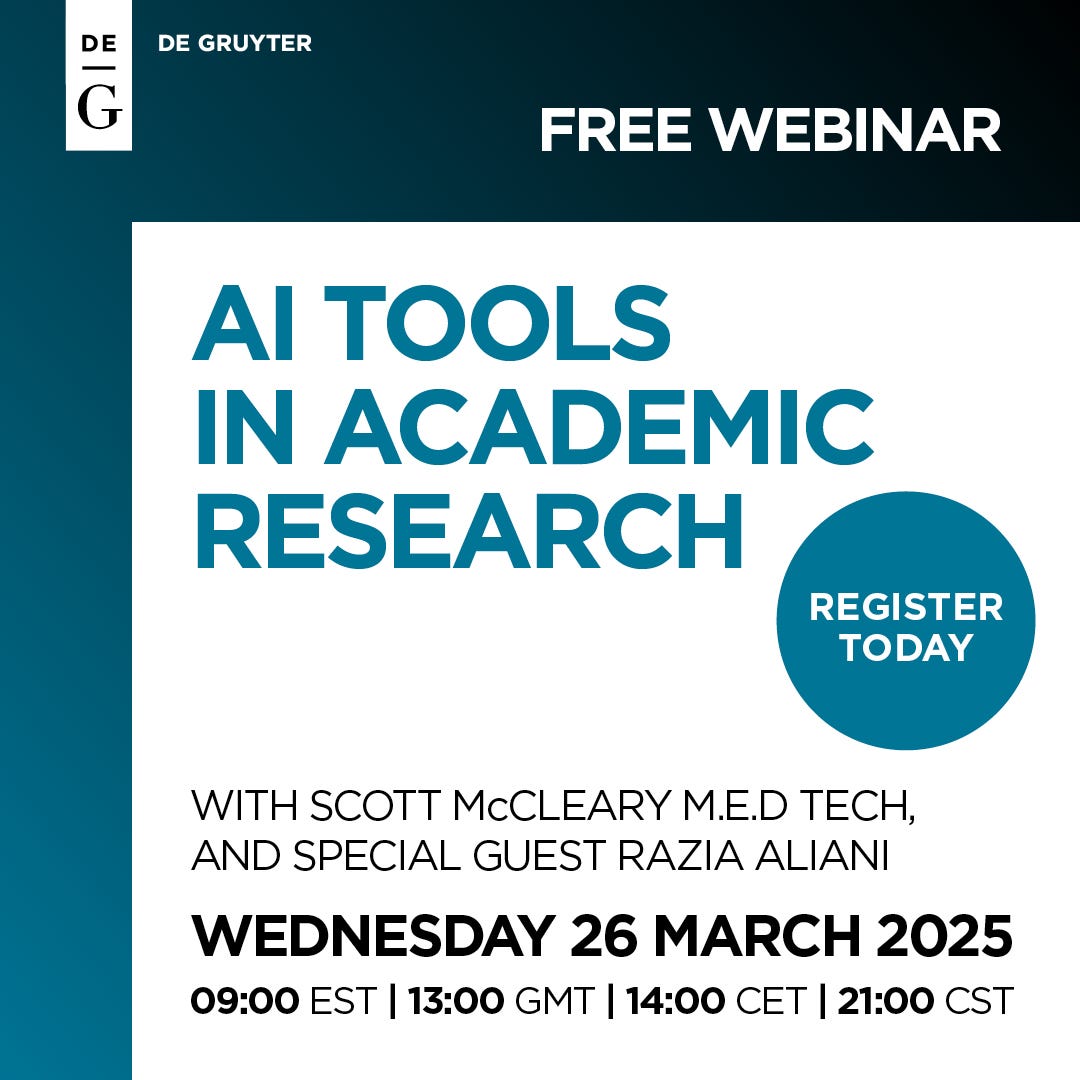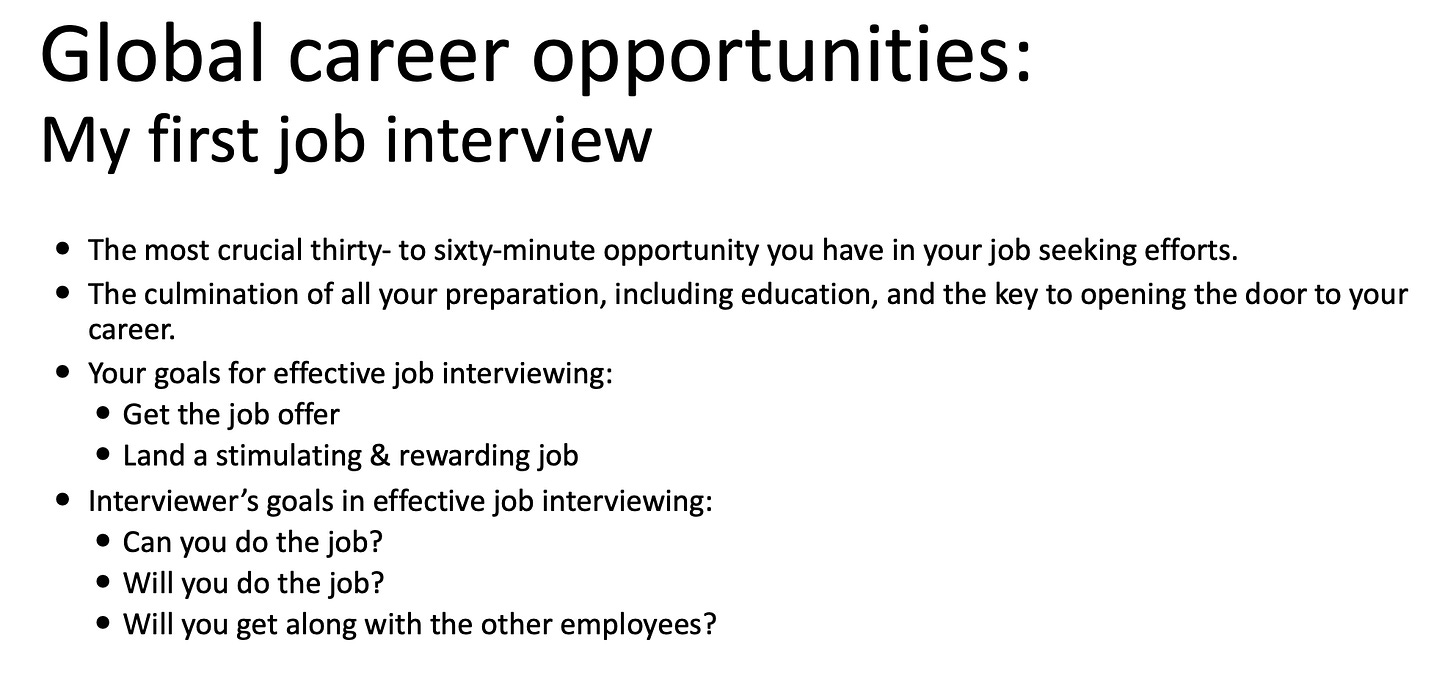Death will be a great relief: No more interviews!
Some tips and tricks (from experience) on the topic of interviews. Jobs. PhDs. Generally, how to manage - also works for meetings ....
This presentation deals with the issue of job interviews. Perhaps your first job interview, perhaps your first opportunity to go to an interview, to try to get a PHD position, try to get a postdoc position, or perhaps your first job.
I hope that this short article will give you a number of things to think about as you prepare yourself for this unique experience.
There really are three rules for effective communication in any format be that an interview, responding to a question in an interview, for example, or giving a platform presentation at a conference or a longer format presentation that you might give as a departmental seminar or workshop.
These are: tell people what you're gonna tell them, give them the information in the main body of your question, present the content of your presentation, and then tell them again what you've just told them.
This format works, irrespective of the length of the presentation; if someone asks you a question, you answer it, then give the detailed information, and then answer it again to reinforce what it is you want to get across to the person on the other side of the desk, the audience in the lecture theater or the panel in the job interview.
Beforehand ….
However, before going into your job interview, before going into an interview for a PhD position, or a postdoc or a job, it's very important to have done your homework about the position and about the people who are going to be interviewing.
So not just the project, or not just the job, but also know a few things about the people who are going to be doing the interview: check them out online, investigate their research, and be prepared to make the interview into a conversation.
Know some things about the people who you're going to be talking to, be prepared to talk about yourself and your work and your experiences, but also about their work, their projects.
… and now this ….
Learn about our upcoming FREE Webinars!
Webinar: Artificial Intelligence (AI) in Academic Research
Using AI Tools in Academic Research
Have you used AI tools like ChatGPT in your research but are unsure about ethics and compliance?
Join us on Wednesday 26 March at 09:00 (EST) | 13:00 (GMT) | 14:00 (CET) | 21:00 (CST) where publishing expert Scott McCleary M.Ed. Tech and special guest Razia Aliani who will share insights and tips on how to use AI tools ethically and responsibly when conducting your research.
Top-To-Bottom! Success Tips For The Whole Research Cycle!
Mar 20, 2025 11:00 AM
In this interactive session, Dr. Gareth Dyke shares proven tips to help you navigate the three key stages of research publishing, from concept development to final publication.
… back to the blog ….
Have ideas about what you want to do in the future; where do you see yourself in five years time, for example, and make sure you thought about the structure both of the interview and of the role of the job, the PhD, the Masters that you're applying for.
Think about questions: what's going to happen during my interview? What have I been told to expect? Who's conducting the interview? What is the interview for? What is it intended to accomplish? How long does it going to last for?
You need to be prepared to time the answers that you; to give two questions to fit into the space of the interview at ten minute interviews is obviously very different to a half day interview.
How long will it last? Where is it going to be conducted? How am I going to be evaluated? What can I expect?
Also know about the evaluation mechanism for the outcome of the interview. Will it be based on a predetermined checklist, for example, like applying to a PhD program at a UK university.
In the interview …
In a job interview: this will be much more based on people's first impressions and the way that you answer the questions that get given to you.
You know during the process, so people will give you two kinds of interviews generally in your career: one-on-one or group interviews.
In the one on one for, the much more often used scenario you going to get an informal section in an informal setting and the questions are likely to be structured, written out, based on job requirements, and they are going to be the same questions asked of each candidate.
Whereas in a group interview you'll meet with more than one person at a time and so teamwork is important and working out one question at a time; if you're interviewed by a panel of people, the most important thing to remember is to keep your hands still and make eye contact with the person who are asking you the question.
Eye contact is important: I will come back to that in a minute, but make eye contact when you answer the question, but don't stare because people think that if you're if you're staring at them you are nervous, you're unsure.
Or you make eye contact but don't necessarily maintain. This crucial opportunity is in a job interview that you're going; in terms of finding that unique opportunity, to further your career, this can be viewed as the culmination of all your preparation, your education, and indeed a key to opening the door to your career.
The most important thing to remember about a job interview is that you have the interview!
You've already gone through the most difficult part of the selection process; maybe 200 people applied for the position, or 10 people applied for the position, but you've made it into the shortlist. You've made it into the small group of people who are going to be actually interviewed for the position.
You can relax. You can take it easy: prepare yourself, get ready, deal with your nerves by thinking about the fact that you are in a good position because you've made it through the most difficult part of the whole process.
I think it's important to have, as we've discussed, clear advance knowledge of the company, of the PhD, of the position that you're applying to.
Know what your answers are going: If you're nervous about this, make a list of questions that you wouldn't like to be asked in the interview and answer them on paper, prepare yourself to answer questions that you wouldn't like to be asked.
Be prepared to convince the interviewer that you can accomplish his three goals or her three goals.
You're able to do the job, you will do the job, and thirdly and perhaps most importantly you're going to be a good team player, you are gonna fit in with the group of people that you going to be working with you. You get along with other employees.
As I said before, job interviews, once you get to that stage are actually quite pleasant, quite friendly, so enjoy it, turn it into a conversation, but remember that the first few seconds are the most important: be confident and try using number of techniques that you can learn to make a good impression in the first few seconds.
It really is those first few moments when you walk into the room, when you shake hands with the interviewers for the first time that impressions will be formed.
These situations, these kinds of situations, are all about connecting, bonding with people in order to put them at ease.
Try to be confident, try to be friendly, and try to be relaxed because you'll be more socially desirable and people will relax in your company.
You will connect with them. This starts from the very first time you meet someone, maybe at the entrance to the building, or outside the interview room; you have to be on your guard, you have to be ready to perform from the first moment that you meet with somebody.
Please member that a first impression when you first meet somebody, your reaction to them, is very emotional; it's not necessarily rational.
Presented with a range of different people, your reactions to them when you first meet them are not necessarily based on anything empirical, based on anything we can measure; it's an emotional reaction.
I would say make eye contact for at least two-thirds of the time that you're talking to people but not all the time and try to nod every so often in response to things that they say, but not constantly smile.
Even if you're in a bad mood, be socially generous, be interested in what people are saying to you, even if you don't feel this and be careful about oversharing too much information about yourself.
Don't disclose too much in the first interview. The first time that you meet people, make people want to know more about you, check your impulse to use that other person's name repeatedly, and never use first names in interview situations.
Don't continually say ‘yes Richard’, ‘yes Richard’, ‘yes Richard’, if you know, for example, that the interviews name is Richard.
You should be saying ‘yes Mr Smith’, but don't use the name too often, use it only infrequently.
This is something that you can be trained to do; if you look at some of the educational materials that we have on our website, these situations, you can develop skills that will help you to be effective, confident, and relaxed in job interview situations.
Radiate accessibility, be interested in other people, ask people questions: if someone asks you a question, you them back: ‘how many kids do you have’, ‘I have three’, etc.
These kinds of techniques make people interested in communicating with you.
Match the way that you speak to other people, listen to the way that they speak, speak at the same speed as them, speak with the same intensity level, the same volume level.
This is a technique that makes other people feel relaxed in your presence when you meet people for the first time; use a firm, confident, but not bone crushing handshake, and as we've mentioned, eye contact is very important.
Avoiding eye contact can be used as a sign of deception, disinterest, or indeed lack of confidence, but don't stare at people.
Try to follow the general rule one when talking to someone in a conversation. About two-thirds of the time eye contact is good.
If an interviewer indicates a place to sit, sit in it as you enter a room, into a meeting.
In a job interview, try to sit as close as possible facing the person leading the interview, be relaxed, don't slouch; lean forward slightly to show interest, but don't lean on your elbows, don't lean on your desk, don't slouch, and use your hands naturally.
Move them naturally, don't wave them around, don't cover your mouth, hold your head or twist your hands and then fiddle with things in your pockets.
And finally … This is a general tip for all kinds of presentations ….
I always remove everything from my pockets before I give a presentation or go into a meeting because there's always that temptation to take out something and fiddle with it, jangle your money, or something like that.

















